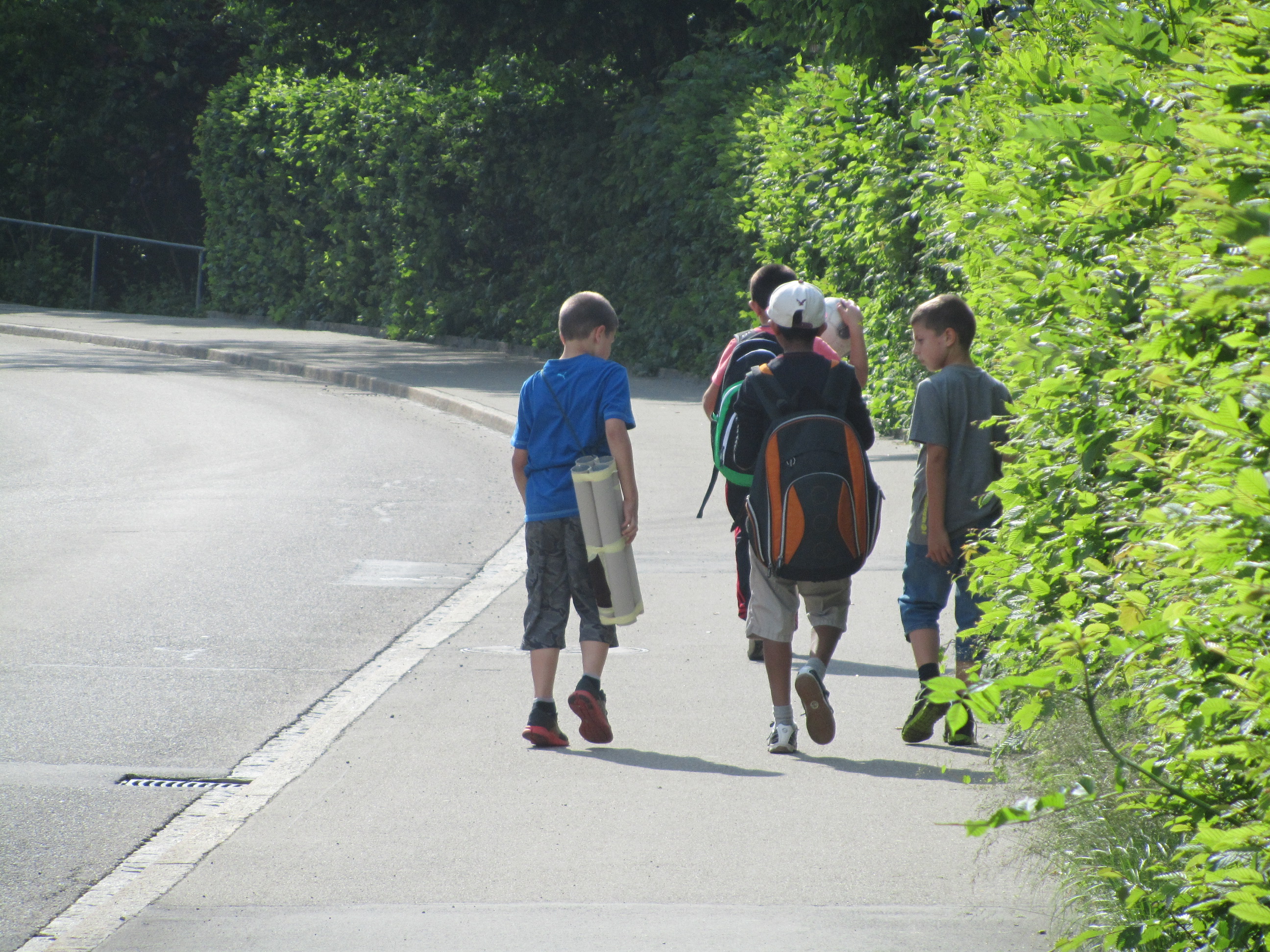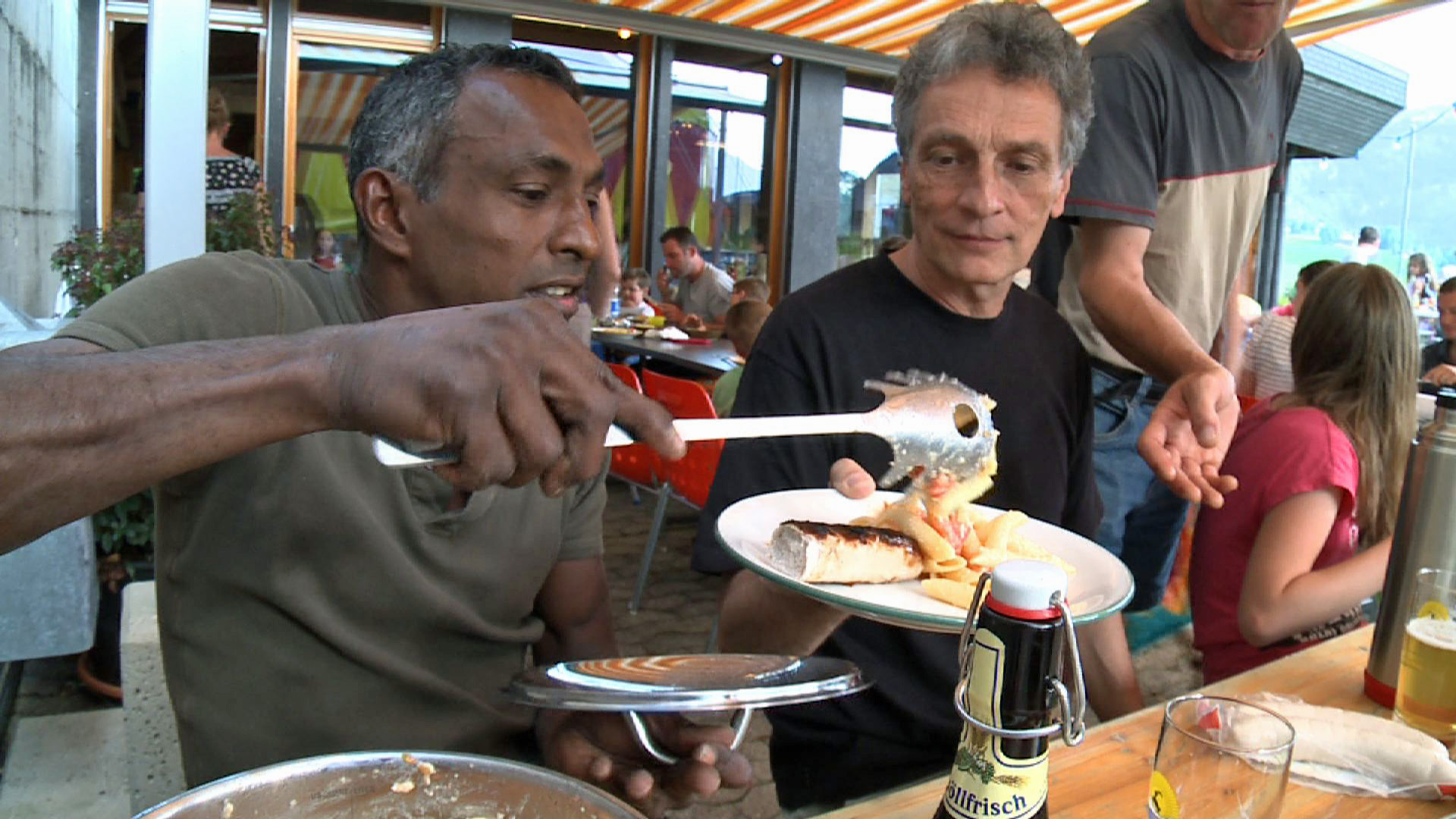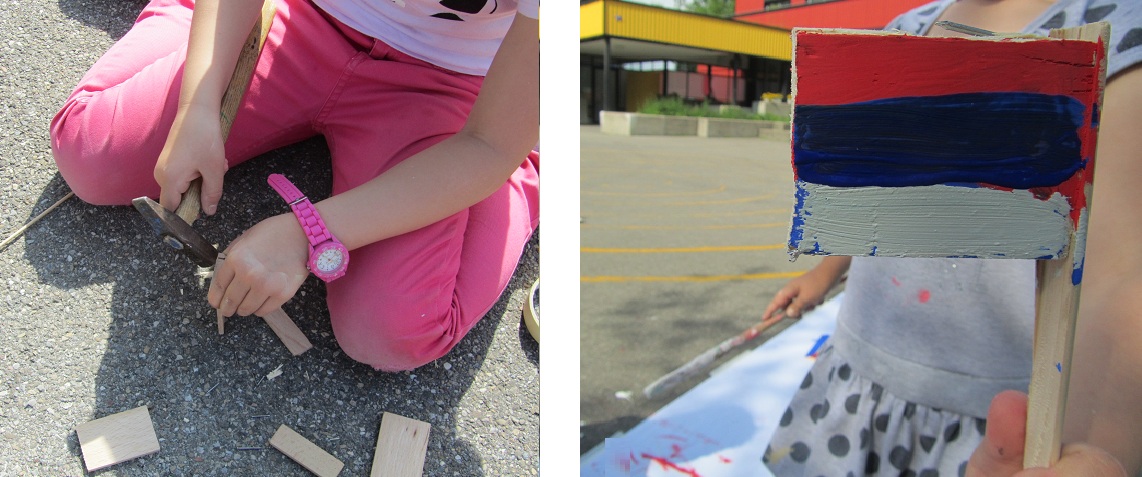First-time funds fight poverty with education

When the Swiss school day ends, most children head for clubs or sports. But those who can’t afford to go are left on their own, already at a disadvantage. For the first time, the federal government is stepping in to break the cycle.
In St Gallen, home to about 70,000 people, they say height above sea level is proportional to income level; wealthier residents live on the ridge overlooking the city, while the poor and working class tend to stay in the long valley on either side of the city centre. That stratification plays itself out in everyday life, especially for children.
“I grew up in a neighbourhood where we were the poorer ones, the working-class people, the lower rung on the ladder,” says Nicole Schönthal, a mother of five who grew up in the hillside town of St Georgen but now lives in the valley, in St Gallen’s Tschudiwies neighbourhood.
“Here you just see another level of poverty,” she says. “That was hard for me, because I saw young people, little kids that don’t know what to do with themselves.”
For Schönthal and her husband, who work as caretakers at the neighbourhood school, funding after-school and extracurricular programmes for their children is “just not doable”, and the area’s lower-income families all find themselves in the same situation.

More
Cheap breaks for struggling fathers
Left behind
Although Switzerland’s social safety net ensures that most people have food to eat and a roof over their heads, the cycle of poverty is very much intact and starts at a young age, according to Bettina Fredrich of Caritas, one of the largest non-profits fighting poverty in Switzerland.
“Children from poorer families don’t have the same early [educational] opportunities as other children,” she says. “Often, activities for young children are funded privately, and poverty-affected families can’t afford them.”
What are the consequences? Fredrich says children who are left out from the chance to develop skills learned in school and build up a personal support network beyond the classroom are much more likely to fall behind academically and end up in the same situation as their parents: scraping by and isolated from the rest of society.
Fredrich cites a recent UNICEF study on the well-being of children in rich countries which evaluated the impact of parental income on children’s lives. Switzerland ranked 16th out of 29 in the education category, highlighting the unequal opportunities that affect young Swiss.
According to the Federal Statistics Office, 580,000 of Switzerland’s eight million people live below the federal poverty line of CHF2,250 per month for a single person and CHF4,050 for a household with two adults and two children younger than 14.
This represented 7.6% of the population in 2011 (the latest figures available), which was around the same as the previous year but an improvement on the 9.5% poverty rate recorded in 2007.
Single parents made up the largest affected group (21.9%), followed by single adults (16.9%) and people with no vocational qualifications (13.7%).
The number of people needing social aid has been constant at three per cent for several years.
According to Bettina Fredrich of the charity Caritas, there are no official statistics on child poverty in Switzerland that show its development over time; however, she says several factors continue to show that it’s a growing problem in Switzerland.
“If you look at the numbers of single-parent homes, we know they are overrepresented in the poverty numbers and that there are more and more divorces,” says Fredrich. “Then, you can assume that the number of kids in poverty is growing or staying the same but definitely not falling.”
Left behind
That divide – and the disadvantages that follow poor children throughout their lives as a result – is the target of the Swiss government’s first-ever initiative to fight poverty nationwide, to the tune of CHF9 million ($9.5 million) over five years.
That doesn’t sound like much, but Ludwig Gärtner of the Federal Social Insurance Office says it’s enough to gain an understanding of what initiatives already exist across the country that are working on giving everyone the same shot at success.
“A lot is already being done in this area, especially in the area of early education,” he says. “But there’s no systematic overview and often no evaluation of what the programmes are doing and whether it could be improved. We don’t have a clear picture of what is happening where, we only know anecdotally that something is going on here, something else there.”
And, some of the government funds could go to support programmes addressing the divide between rich and poor in an “innovative” way, says Gärtner.
The first-ever federally funded programme to fight poverty in Switzerland has provided CHF9 million over five years – starting in 2014 – for increasing educational opportunities for those affected by poverty, from childhood through adulthood.
Its main goals are:
- Establishing a basis for how to address the problem
- Identifying and spreading Best Practices
- Establishing a network of nonprofits and offerings across Switzerland working on poverty issues
Kids in charge
A programme already underway in St Gallen known as “open work with children” could be an example of just such an initiative.
In a neighbourhood on the city’s west side, that day’s offering is buzzing with activity. At a construction station, a small girl with a blonde ponytail furiously hammers away at a self-designed project – a house for her doll. The counsellors say she is here every time the group is offered and always stays the entire time. Elsewhere, clay sculptures dry in the sun and a group of boys construct and decorate fake weapons – yes, weapons – out of cardboard.
“We set clear ground rules with them, that they can’t shoot at other kids or play with them in an open area,” a counsellor explains. “But they wanted to do it, so we let them.”

That’s the idea behind the programme: letting children call the shots,
building a variety of skill sets as a result. They can design their own activities and come and go as they please, but counsellors say most stay until the end because they don’t have anywhere else to go.
When the city first introduced the offering a few years ago in a pilot project, no one was sure who would turn up – but on the first day, they were “overrun”, mostly with children from the city’s lower-lying areas, says Nicole Bruderer, who’s in charge of the city Youth Secretariat’s “open work with children” offerings.
“Kids from wealthier neighbourhoods have other things available to them and their after-school programmes are already fully booked,” Bruderer tells swissinfo.ch. “Kids from the valley could participate in those programmes, but they usually don’t because it’s a different culture up there, it’s expensive and it’s a long way to go…the groups [of children] don’t mix.”
Many larger Swiss cities like Zurich, Bern and Basel have long offered play groups for children that are free-of-charge and available after school and on weekends, when kids might otherwise be left to their own devices.
However, the offering isn’t always available in medium-sized and smaller cities like St Gallen, where the “open work with children” programme started as a pilot project in 2009 and continues to expand into more neighbourhoods.
St Gallen now offers open play groups ranging from “Happy Meal”, where children choose ingredients and help cook a healthy meal, to “Werkmobil,” where children are encouraged to plan and execute their own creative projects. Children may come and go as they please – they are not forced to stay for the duration of the play group, and children as young as six are accustomed to getting around the city on their own.
Someone to talk to
As a mother, Schönthal saw that divide playing out daily in her neighbourhood as she observed children aimlessly wandering around after school, getting into trouble or sharing the streets with unsavoury characters like addicts and alcoholics. So, she and other concerned parents finally placed a call to the Youth Secretariat, looking to at least give the youngest children a chance to stay out of trouble and build a future for themselves.Her timing couldn’t have been better: the city’s open play group was looking to expand into that part of town.
The programme is only a month old in her neighbourhood, but Schönthal already sees an “incredible” difference – families are coming out of hiding to meet their children and, as a result, each other. And, the counsellors who run the programme serve as role models and sounding boards for children when the going gets tough at home or at school.
‘Milestone’
Though Caritas’ Fredrich sees “few concrete goals or measures” in the government programme right now, she hopes her organisation and others dedicated to fighting poverty can benefit from the tailwinds of the awareness that’s building as a result.
“This [government] programme is a milestone,” she says.
“It’s the first time the federal government has accepted poverty as a problem and a phenomenon in Switzerland and has made it clear that something must be done.”

In compliance with the JTI standards
More: SWI swissinfo.ch certified by the Journalism Trust Initiative

You can find an overview of ongoing debates with our journalists here. Please join us!
If you want to start a conversation about a topic raised in this article or want to report factual errors, email us at english@swissinfo.ch.